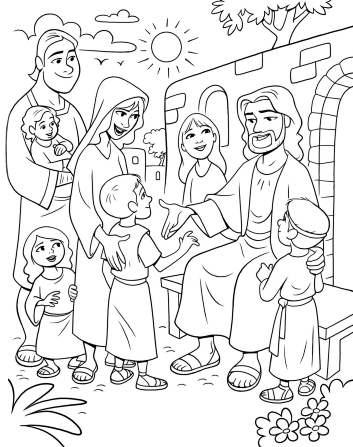 |
| The Holy Family - Schiele, 1913. |
We have been taking a few kicks at family values here recently. We have suggested that it--the family--is the source of most of what we call mental illness.
But isn't this supposed to be a Catholic blog? Most people would probably associate Christianity with the phrase “family values.” It is certainly high on the agenda of the current “Christian right” in the US: “Focus on the Family” and all that. In any case, Christian or not, we’re talking Mom and apple pie here. To those who have memories of a loving family, those memories are deeply holy to them, and so too is the ideal of the family.
True. However, as noted previously, the New Testament actually has very little cheery to say about families. Along with the scribes and Pharisees, the family seems to be a special enemy of whatever Jesus stands for. The most Paul can say about coupling off and settling down to that little suburban home behind a white picket fence is “better to marry than to burn.”
And then there is that bit about priests being celibate and all.
What happened to “Honour thy father and thy mother?” Is this a change between the Old and New Testaments? Apparently not. Deuteronomy 13 warns: “If your very own brother, or your son or daughter, or the wife you love, … secretly entices you, saying, ‘Let us go and worship other gods’ …, 8 do not yield to them or listen to them. Show them no pity. Do not spare them or shield them. 9 You must certainly put them to death.”
And is there a single family depicted in the Old Testament that might be held up as a model of a happy and holy home life? Even the families of the patriarchs, God’s own chosen men?
 |
| Absalom's death. Dutch. |
Adam and Eve? The eldest son kills the second son. Noah? He curses his third son. Lot? He sleeps with his two daughters. Abraham? He intends to kill one son, abandons the other in the desert. Jacob? He tricks his brother out of his inheritance; but one can hardly blame him, given the extreme favouritism of his father Isaac. Eleven of Jacob's sons conspire to kill the twelfth, Joseph. Moses? An orphan. David? An adulterer who has his rebellious son Absalom killed. Solomon? Kills his brother Adonijah, then takes 1,000 wives and concubines. Some home life these guys had.
It’s all pretty consistent. The great Old Testament prophets, like the apostles of the New, seem to leave family behind: Ezekiel, Jeremiah, Elijah, Jonah, all seem to be unaccompanied by wife or wee ones.
Of course, the point might be that apparently being made in the New Testament, that bad families produce good men, as in the case of the apostles. Unfortunately, however, even the prophets themselves seem to be guilty parties in this: Jacob, Noah, David, Solomon, Abraham, all seem themselves to behave very badly to family members. So the point seems instead that little good is to be expected from families in even the best of circumstances.
Heck, even look at Jesus's own family. They had one child, only one, and they managed to leave him behind in the temple in a strange city, and not notice for a full day.
So how then are we to reconcile this persistent insight with the commandment to “honour our father and our mother”?
First, the commandment is unique in the Decalogue in that it gives a specific reason for itself. This itself implies that the Almighty feels some justification, some explanation, is required. The full passage reads “Honour your father and your mother, that your days may be prolonged in the land which the Lord gives you.” In other words, following this commandment leads to long life.
It is not hard to see why. If each generation looks after their parents in the latter’s old age, they will all live a lot longer. That this is the main point of the commandment would be more obvious in most societies than in modern Canada, with its Social Insurance and Government Health Care. In most times and places, an elderly person who is not cared for by his or her children is dying in the street.
 |
A view from the tragic life story of Old Mother Hubbard.
"She went to the bakery to buy him some bread. And when she returned, the poor dog was dead."
But probably still edible. |
In the New Testament, Jesus shows the same understanding of the commandment:
Jesus asks the Pharisees, “And why do you break the command of God for the sake of your tradition? 4 For God said, ‘Honor your father and mother’ and ‘Anyone who curses their father or mother is to be put to death.’ 5 But you say that if anyone declares that what might have been used to help their father or mother is ‘devoted to God,’ 6 they are not to ‘honor their father or mother’ with it. Thus you nullify the word of God for the sake of your tradition.” (Mark 15:3-6).
His immediate application of the commandment is to caring for your parents in old age. Jesus adds, as does the Old Testament too, that one must not curse one’s parents. But then again, as Jesus points out in the same sermon, one should not curse anyone. And, as the Book of Sirach points out, the time when one is most likely to revile one's parents, and when it matters, is in their old age:
“O son, help your father in his old age, and do not grieve him as long as he lives. Even if his mind fails, be considerate of him; do not revile him because you are in your prime. (Sirach 3:12-13).
In the
Catechism of the Catholic Church, the implications of the commandment are extrapolated into many other realms, but we still find ambiguity towards the family. To begin with, the Catechism insists that this commandment is not binding only on children, but that it “includes and presupposes the duties of parents.” Strictly, this means that if parents do not do their own duty first, their children are not bound.
This makes perfect sense if the commandment refers primarily to the duty to tend to and respect one’s parents in old age. Their own performance of their duties as parents is prior in time, and a prior condition. If they were not good parents to the best of their abilities, they are not owed this.
Why not cite the duties of the parents here as well? Because it is not necessary. Given this need for care in their old age, a parent is in most times and places bound by pure self-interest to treat his or her children well. It is only the latter than need to be reminded of their duty, and called to it by sheer moral force.
Nor would most small children, as a matter of nature, need to be reminded of our duty to “obey our parents.” It is as instinctive as little ducks following their mother. It is not moral behavior. Nor are children yet fully morally responsible. Conversely, at this point, the parents do not need any help in having their will obeyed: they have absolute power.
It is only if we presume the parents are old and powerless that the commandment becomes of some significance.
Nor, at this age, can the commandment require obedience. As the Catechism points out, obedience is not owed a parent as soon as the child reaches maturity or leaves the parental home. This happens, in most times and places, at a quite early age—thirteen, by Jewish tradition. So obedience to parents cannot be the main thrust of the commandment.
What are the duties of parents?
First and foremost, according to the Catechism, even before looking after their children’s physical needs, it is to educate. “The right and the duty of parents to educate their children are primordial and inalienable.” Most important is to educate them in the faith; but next to this, and involved with it, is to educate them in their own chosen vocation.
Parents are expressly prohibited from pushing their children into a particular vocation or profession. They also must not pressure their children into marrying or not marrying any particular person. “Parents should be careful not to exert pressure on their children either in the choice of a profession or in that of a spouse.” Of course, the child’s physical well-being must also be attended to, and parents must not play favourites. That, in the end, is the message of Shakespeare's very Catholic play,
King Lear—it is Lear's tragic flaw. (And yes, Shakespeare was a Catholic writer).
 |
| Cordelia's Farewll, King Lear; Edwin Abbey |
The Catechism makes clear that the duties of the individual to the family are parallel to the duties of the individual to the state.
Which is, in Biblical terms, damning with faint praise. Render unto Caesar what is Caesar's, certainly; but this also implies that whatever is of Caesar is not of God. The New Testament seems to view governments as intrinsically evil. When Jesus is tempted in the desert, the Devil in person shows him “all the kingdoms of the world,” and says, “I will give you all their authority and splendor; it has been given to me, and I can give it to anyone I want to.7” (Luke 4: 5-6).
So all kingdoms are in Satan’s hands, and he chooses their rulers.
Dig it; that's pretty damning. And so, might the same be so of families?
All else being equal, we should obey the law, for the sake of general peace and order, but “Citizens are obliged in conscience not to follow the directives of civil authorities when they are contrary to the demands of the moral order” (Catechism of the Catholic Church). Similarly in the family, a child is to obey his parents, when in their home and underage, “in all that they ask of him when it is for his good or that of the family.” That is a rather narrow remit. It is just what self-interest alone would require.
If, however, Christianity these days looks very pro-family, it is because the family is under attack. And it is under attack by the state. As we see above, the state is in no way preferable. In fact, by the principle of subsidiarity, it is worse. Salvation comes at the level of the individual, as an independent moral agent. It follows that all decisions should take place at the closest possible level to the individual. What the individual can decide for himself, he should. If any only if he cannot handle something by himself, it devolves to the next smallest possible group, which might well be the family. The larger the group, the farther away from the individual, the farther it is from God and from salvation. This is because the individual has less influence in a larger group.
So family comes before the state.
This must not be twisted into an idolatry of the family.
















_-_James_Tissot_-_overall.jpg)



















